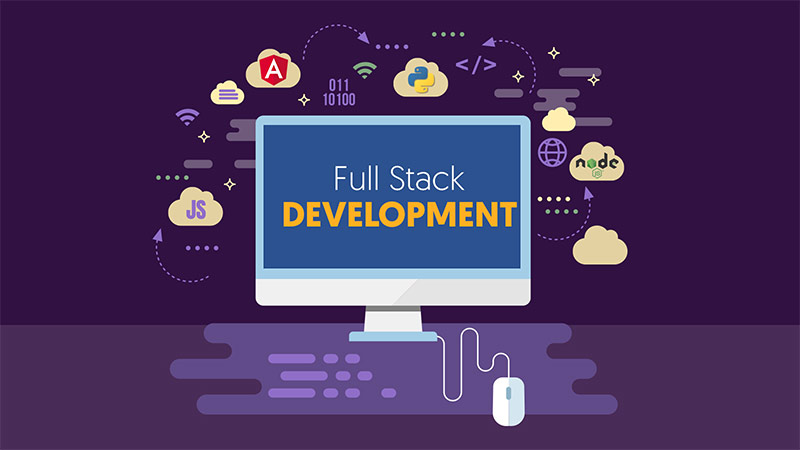Future Scope of Java Full Stack Development: Trends to Watch

As the digital transformation wave continues to shape global business ecosystems, Java full stack development has solidified its place as a cornerstone of modern web and software solutions. Businesses across industries now seek to hire full stack developers who can build end-to-end applications, combining robust backend functionality with sleek, responsive frontends. With cloud computing, AI integration, and evolving frameworks reshaping the tech landscape, let’s delve into the future scope of Java full stack development and the top trends every full stack software developer should watch.
Why Java Full Stack Development Remains a Powerful Choice
Java, a time-tested language, continues to lead enterprise-level development due to its platform independence, scalability, and mature ecosystem. From banking applications to eCommerce platforms, Java’s versatility empowers full stack web developers to engineer reliable, secure, and performance-driven solutions.
Modern full stack developers leverage Java for backend logic using Spring Boot, and combine it with frontend tools like Angular, React, or Vue.js, making them indispensable assets to tech teams aiming to build holistic solutions.
Growing Demand for Full Stack Software Developers
The role of a full stack software developer has transformed from a generalist coder to a cross-functional technologist capable of architecting complete digital solutions. With organizations striving to minimize costs while accelerating product development, the value of a developer who can handle both server-side logic and client-side experiences is higher than ever.
According to industry reports, companies actively hire full stack developers proficient in Java, React, and Spring Boot as they provide a competitive edge in agile product development cycles.
Top Trends Shaping Java Full Stack Development
1. Microservices Architecture with Spring Boot
One of the strongest trends reshaping Java full stack development is the shift from monolithic applications to microservices. Microservices enable modular development, faster deployments, and easier scalability. Java’s Spring Boot framework simplifies microservice development, making it easier for full stack web developers to manage independent services and integrate them using lightweight protocols.
2. Cloud-Native Development
Cloud computing has become a non-negotiable aspect of modern software delivery. With platforms like AWS, Azure, and Google Cloud, applications must be designed to be cloud-native. Java developers are embracing containerization (Docker) and orchestration (Kubernetes) to deploy scalable applications. Mastery of these technologies will define the future success of a Java full stack developer.
3. API-First Approach
The API-first development paradigm is becoming standard in full stack architecture. It allows frontend and backend developers to work in parallel and promotes modular, reusable services. RESTful APIs, and more recently, GraphQL, are increasingly used to streamline communication between client and server. Java’s ecosystem supports both seamlessly, and full stack developers are expected to integrate and manage APIs efficiently.
4. AI and Machine Learning Integration
AI is no longer limited to data science teams. Java full stack developers are now integrating AI-driven features like chatbots, recommendation engines, and predictive analytics directly into web applications. Libraries such as Deeplearning4j and tools like TensorFlow Java offer powerful ways to embed intelligence in applications. The future full stack software developer will be one who can not only build but also intelligently enhance apps with smart features.
5. DevOps and CI/CD Pipelines
Companies now expect Java full stack developers to participate in the deployment lifecycle. DevOps tools such as Jenkins, GitHub Actions, and Docker are essential for automated testing, integration, and deployment. Mastery of CI/CD processes ensures faster time to market and continuous improvement. A developer who understands both code and deployment architecture is a valuable asset.
6. Progressive Web Apps (PWAs)
As mobile usage increases, progressive web apps are becoming a preferred solution for delivering native-like experiences in the browser. Full stack developers combining Java backend logic with PWA frontend frameworks can build fast, installable, and offline-capable applications. The ability to build PWAs will differentiate the next-gen full stack web developer.
Essential Skills for Java Full Stack Developers
To stay competitive and relevant, developers should build expertise in:
- Backend: Java, Spring Boot, Hibernate, Microservices
- Frontend: HTML5, CSS3, JavaScript, React.js, Angular, Vue.js
- Database: MySQL, PostgreSQL, MongoDB
- DevOps: Jenkins, Docker, Kubernetes, Git
- Cloud Platforms: AWS, Google Cloud, Azure
- Testing: JUnit, Selenium, Mockito
- Tools: Maven, Gradle, IntelliJ IDEA, Visual Studio Code
These tools and frameworks form the backbone of a strong full stack development skill set and are pivotal in shaping high-performing developers.
Industries Driving the Demand for Java Full Stack Developers
Several industries are leading the hiring surge for skilled Java full stack developers:
Fintech: Robust security and real-time processing needs are best addressed by Java-based full stack systems.
eCommerce: The need for scalable, user-friendly applications has increased demand for agile full stack development.
Healthcare: With digital health platforms booming, full stack developers help build HIPAA-compliant, data-driven applications.
EdTech & SaaS: The growth in online platforms calls for developers who can build seamless learning experiences.
Businesses actively hire full stack developers to reduce dependencies between frontend and backend teams and to build quicker prototypes and MVPs.
Remote Work and Global Opportunities
Remote work has unlocked global opportunities for Java full stack developers. Companies across the US, UK, Europe, and APAC are actively hiring remote full stack software developers from regions like India and Southeast Asia. This shift has elevated freelance and contract-based opportunities and has expanded the market reach for skilled developers.
The Future of Hiring in Full Stack Development
As technology continues to evolve, so will hiring trends. Recruiters are no longer looking only at degrees—they want portfolios, GitHub contributions, open-source involvement, and problem-solving aptitude. Developers who stay ahead of the curve with continuous learning, certifications, and hands-on projects will remain highly sought-after in the global tech marketplace.
For businesses aiming to hire full stack developers, assessing a candidate’s proficiency across multiple layers of the tech stack—from REST API design to DOM manipulation—is crucial to ensure versatile and agile development.
Conclusion: Java Full Stack Development Has a Bright Future
The future of Java full stack development is dynamic, innovation-driven, and full of potential. From microservices and cloud-native development to AI integration and CI/CD pipelines, the modern full stack web developer is not just a coder but a solution architect. Whether you are looking to hire full stack developers or become one, the opportunities in this field will only grow as more companies transition to digital-first operations.
Java full stack developers who adapt to changing tech trends, master key tools, and maintain a strong foundational understanding of both frontend and backend will continue to thrive in the coming years.
Note: IndiBlogHub features both user-submitted and editorial content. We do not verify third-party contributions. Read our Disclaimer and Privacy Policyfor details.



